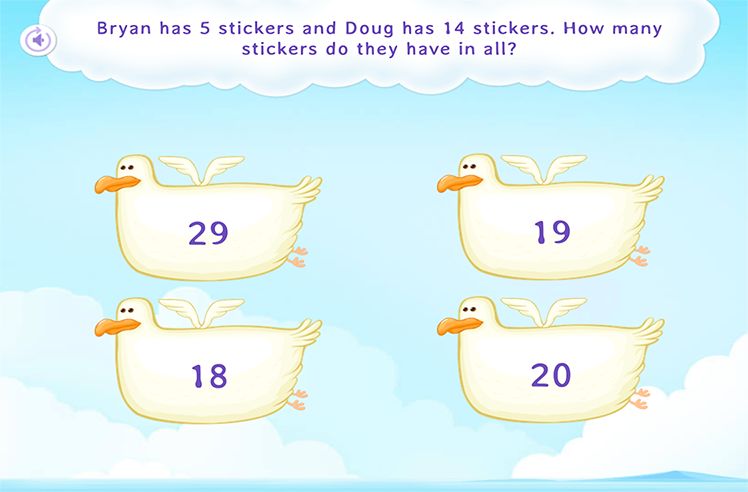What Is Classification in Mathematics?
Classification involves grouping objects (or organizing items into groups) based on shared characteristics. The process of classification includes identifying key attributes, defining categories, and placing objects or data into the appropriate category based on their attributes.
Example 1: In the given image, you can see that the wooden toys are classified based on the geometric shapes they represent.
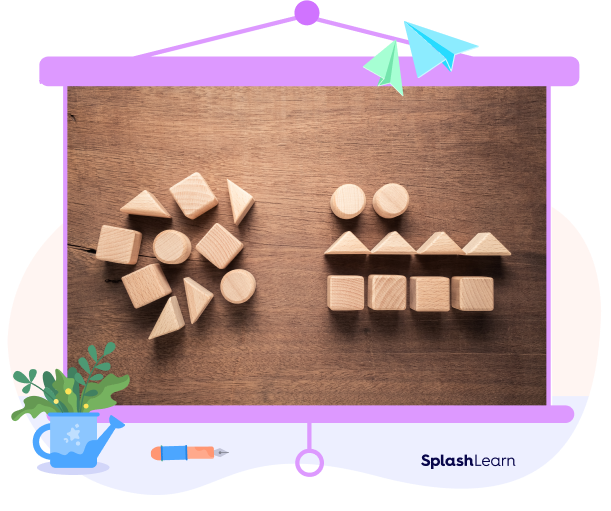
Example 2: We can classify people based on their height, eye color, age-group, color of their outfit, etc.

Recommended Games
Definition of Classification
Classification can be defined as the arrangement or sorting of objects into groups on the basis of a common property that all of them have. It refers to the process of categorizing objects or numbers into distinct groups or classes based on shared characteristics or properties.
This categorization helps in organizing and understanding mathematical concepts, making it easier to work with and analyze different elements within the same class.
Recommended Worksheets
Classification and Sorting
Sorting refers to arranging objects into a certain order (ascending or descending). Sometimes, sorting also refers to putting similar things together, like all the flowers, or all the fruits.
Classifying is when we already decide which groups things belong to. For instance, when a teacher tells us to put red pens with red pens, blue pens with blue pens, etc. When we do this, we learn what makes things the same and different.
What Are the Different Ways of Classification?
We can classify terms or figures on the basis of various parameters depending on the objects we are dealing with. Let’s discuss a few ways to understand this.
- Classification of Objects by Shape
The objects can be classified into different categories based on their shape, such as triangles, quadrilaterals, circles, etc.
Example: We have classified different objects on the left based on their shapes.
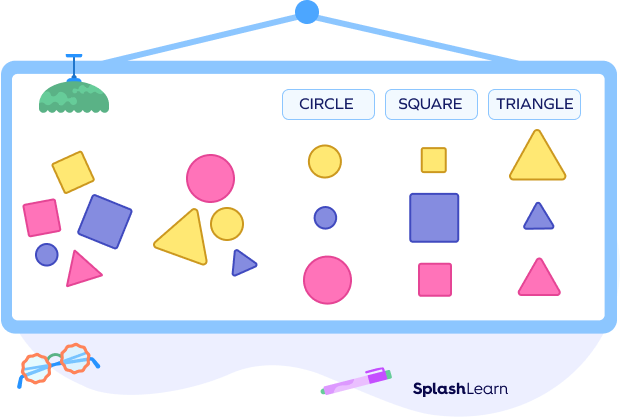
- Classification of Objects by Size
Classification of objects by size is the process of arranging items into groups based on their dimensions, such as length, width, or height. This categorization helps in organizing and comparing objects according to their size attributes.
Example: Stores classify clothing items into categories such as small, medium, large, extra-large, etc.
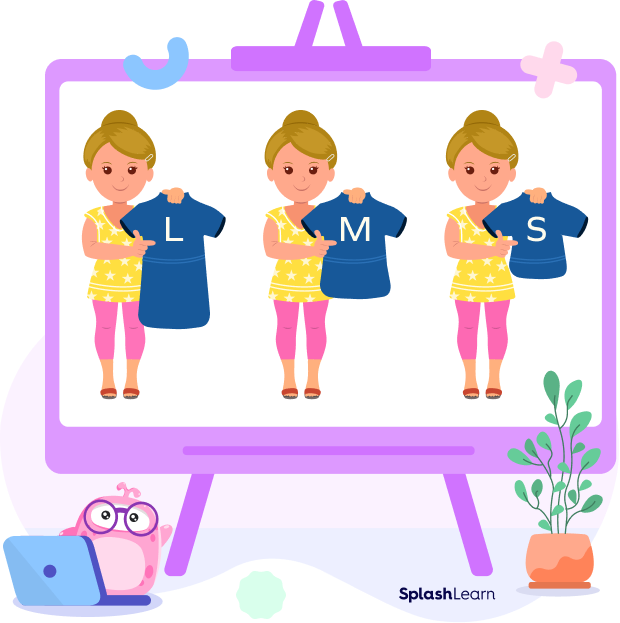
- Classification of Objects by Color
Classification of objects by color involves grouping items based on their color attributes. This categorization is a visual way to organize and differentiate objects by their hues, allowing for easier identification and comparison.
Example: Here’s an image showing the classification of different objects, animals, birds, etc. by their color.
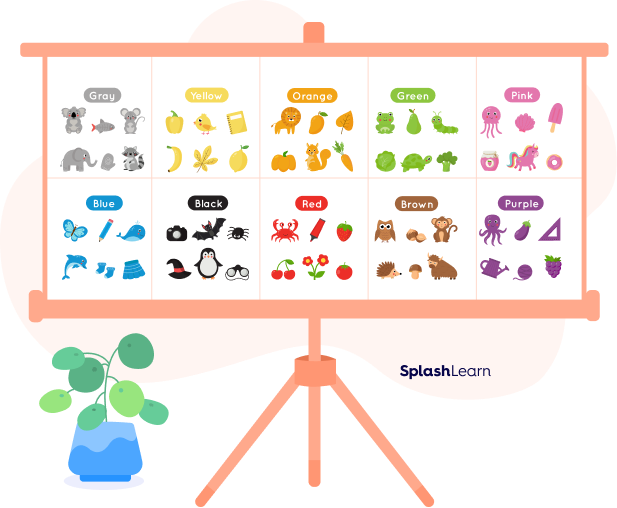
- Classification of Objects by Quantity
We can also classify or arrange the given set of objects based on the number of objects present.
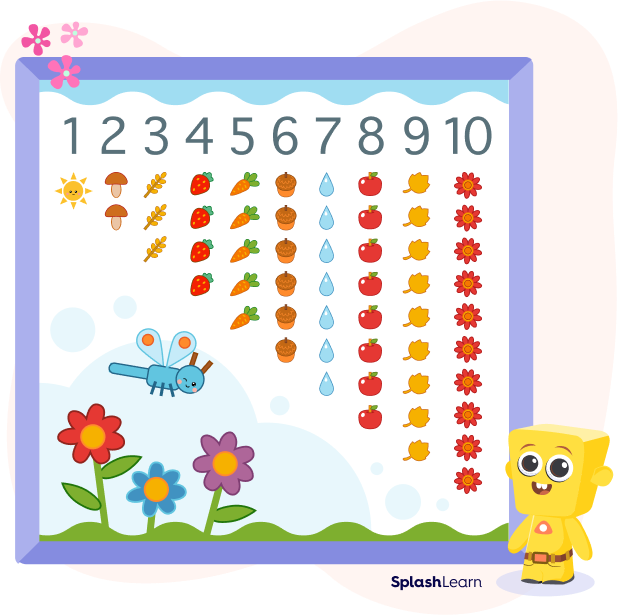
Classification of Numbers
We classify numbers based on their common properties. Here are some examples:
- Whole Numbers: 0, 1, 2, 3, 4, 5, …
- Natural numbers: 1, 2, 3, 4, 5, 6, …
- Integers: …, -3, -2, -1, 0, 1, 2, 3, …
- Positive integers: 1, 2, 3, …
- Negative integers: -1, -2, -3, …
Classification in Real Life
Let’s discuss a few real-life examples where we use classification.
- Classification of toys into groups by color, shape, or types
- Classifying laundry items by color, person, or type of fabric
- Classification of grocery as fruits, vegetables, and snacks
- Classifying books based on authors or genres
Facts about Classification
- Classification helps us organize things into groups based on their common features.
- We classify objects every day, like when we sort our toys, clothes, snacks, etc.
- Classification helps us understand the given data better since we get a clarity on the patterns and properties of elements present in the data.
Conclusion
In this article, we learned about the concept of classification, which allows us to categorize objects or elements by identifying the common properties or characteristics. Let’s solve a few examples and practice MCQs for better understanding.
Solved Examples on Classification
1. Classify the numbers on the basis of the number of digits.
23, 65, 178, 6, 192, 0, 87, 99, 209, 7
Solution:
One-digit numbers: 0, 6, 7
Two-digit numbers: 23, 65, 87 and 99
Three-digit numbers: 178, 192 and 209
2. Classify the following happy faces based on colors.
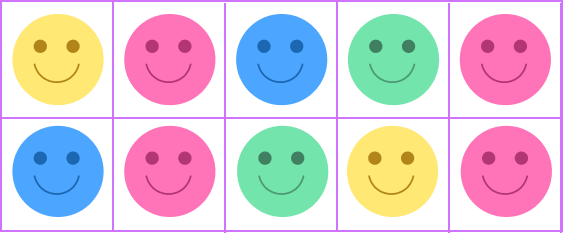
Solution:
There are 4 red emojis, 2 green emojis, 2 blue happy emojis, and 2 yellow emojis.
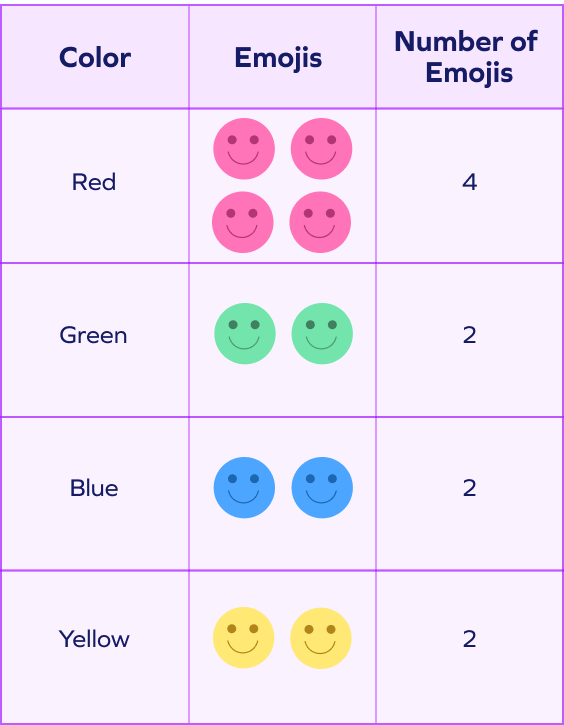
3. Classify the following as 2D and 3D shapes.
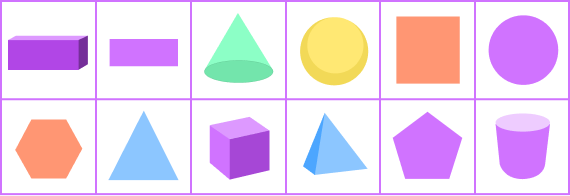
Solution:
- 2D shapes: These are flat plane shapes.
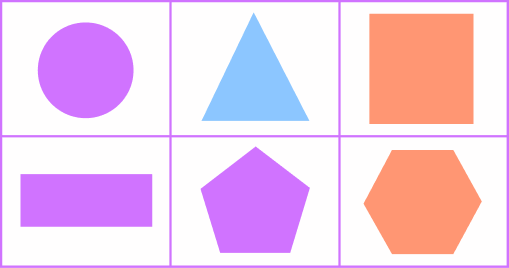
- 3D shapes: These are three-dimensional shapes or solids.
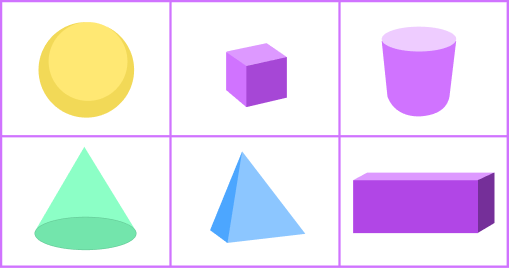
5. Classify the following alphabets as vowels and consonants.
S D A O P Y U E T R
Solution:
The vowels in the English alphabet are A, E, I, O, and U.
In the given set of letters, the vowels are A, O, U, and E.
The consonants are S, D, P, Y, T, and R.
Practice Problems on Classification
Classification in Math - Definition, Examples, Facts, FAQs
What does classification mean?
Classification of objects refers to grouping objects on the basis of similar attributes.
Find the odd one out.
Sphere is a 3D shape. Other shapes are 2D shapes.
How many categories can be made if we classify given candies by color?
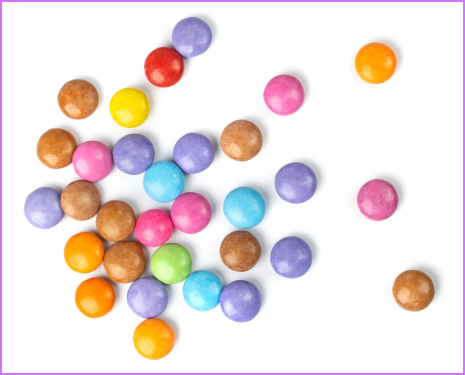
8 colors of candies are present in the given image (Brown, Pink, Orange, Violet, Sky blue, Green, Red, Yellow)
So, we can classify the candies by color into 8 categories.
How many integers are there in the given set of numbers?
$0, –\;7, 9.5,\; \frac{4}{3},\; 10,\; -\;\frac{5}{6},\; 16.5,\; –\;12$
There are four integers: 0, – 7, 10, –12.
Frequently Asked Questions about Classification
What is the difference between classification and ordering?
Classification is a way to arrange or sort the objects into groups on the basis of a common property that all of them have whereas
What is the difference between classification and comparing?
Classification is when we put things in groups because they share something in common, while comparing means deciding if one number is smaller, larger, or the same as another number based on their values.
What is the difference between classification and sorting?
Classification involves organizing objects into categories based on common attributes, while sorting generally involves arranging objects in a specific order, such as ascending or descending.
What is matching?
Matching is the process of identifying and pairing similar items.





















